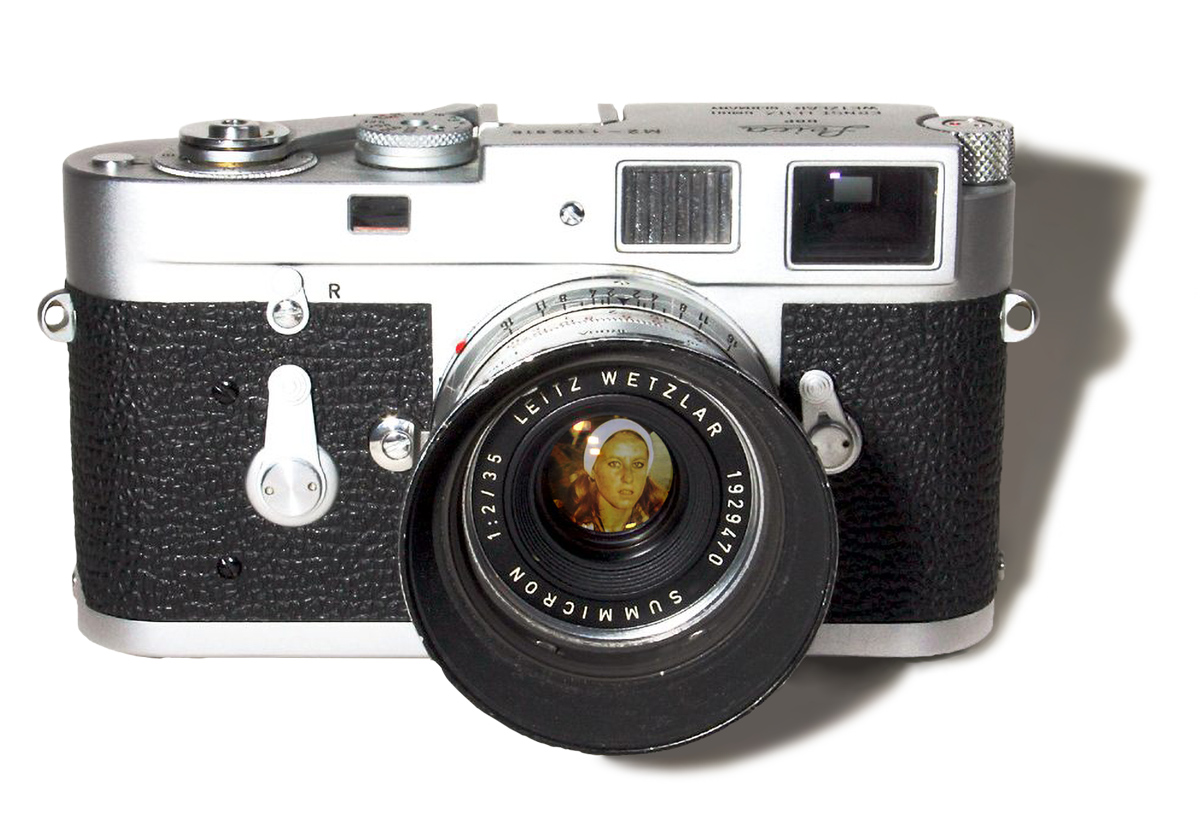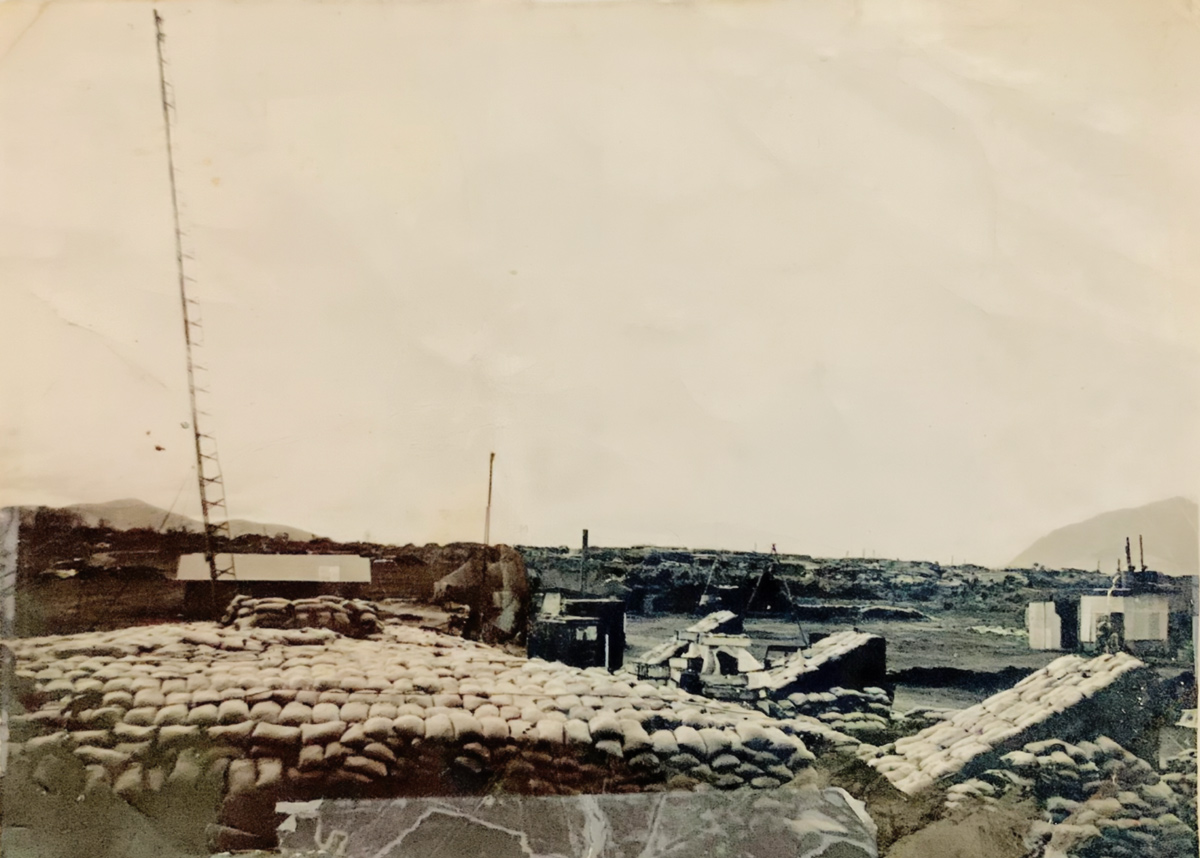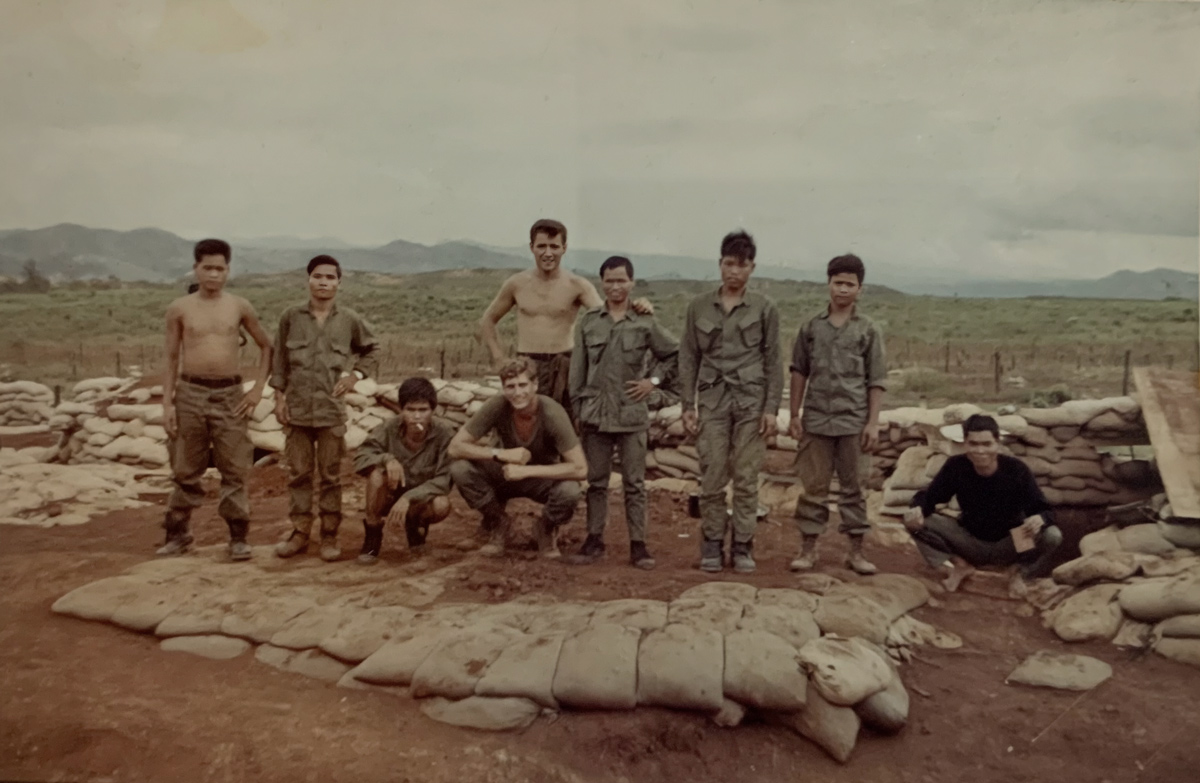CATHERINE LEROY
03/13/68

By Denis Chericone
She just appeared. The four of us were playing poker on one of the stretchers in a corner of the bunker when I had gotten up to get some more smokes from my field jacket. As I walked towards my stash, I looked up, and there she was, held framed within the rough two-by-four molding of the entryway. She was simply standing there with a big smile on her face, a face full of mischief and grace. There was a glow to her, and I immediately thought I was imagining things. I kind of sleepwalked towards her with my arm outstretched so I could touch her and prove to myself she wasn’t a ghost. Then she spoke, with an accent straight out of a French movie, “Allo, my name is Catherine, and I am here to get your stories and take your pictures.”
When the others heard her voice, they were quickly by my side, all of us gaping in blazing stupefaction. Her smile was like a warm spring day with a cool breeze spreading itself over, in, and around every living thing, especially us. When we finally recovered enough to speak, we welcomed her with all the cordiality we were able to muster. She knew she was delivering a very special moment for all of us, and she was gracious and very indulgent of our stumbling attempts to make her feel welcome. She fielded our barrage of questions, you know, “Where did you come from?” “How did you get here?” “Can we run away together?” the usual stuff, with the warm patience and aplomb of a woman dealing with a hopelessly smitten suitor alone with his inamorata for the first time. We made her as comfortable as possible, and it helped that she was dressed in the same manner as we were — baggy and stained fatigues, flak vest, and helmet, which, when she removed it, allowed her subdued long golden hair to come tumbling down around her shoulders. Yeah, definitely from the gods. She was inquisitive, and we tried to fill her in without breaking any top-secret restrictions concerning our duties. Of course, by that time we only had one duty: stay alive.

The main Special Forces CCN bunker at FOB 3, Khe Sanh. (Photo by Denis Chericone)
We were definitely under the hammer when she showed up. It was sometime in early March, and the siege was roaring along at top speed, heading for destruction, ours. The NVA owned us by that time and were so plentiful around our base that whenever our guys wandered more than a few hundred meters past our wire, they usually didn’t come back. She must have known what we were doing up there because after all, she was a journaliste, but she had the good grace not to henpeck the point as it was obvious that we were grounded and grimly holding on to our lives.
We couldn’t offer her much, just some water; but one of the guys apologized for not having a bottle of wine for her. She liked that.
Gods, she was so very beautiful, especially beautiful to us in that particular moment, and in her elegantly chivalrous way, she made us feel that everything was going to be okay.
When I began thinking on the whole experience after she left, I realized that the power of the gods was finite, that when certain events were set in motion there wasn’t much they could do about it, and that she was a reminder from them to let us know they were keeping an eye on things and, however unlikely it appeared, they still cared about our welfare. I know now that true gods are able to soothe and console their charges when the cosmos has decided that someone or some group is to be beset by extreme misfortune (yes, the cosmos always does have the last word). It became apparent to me at Khe Sanh, and I’ll believe forever that she came to us bearing the power of awed revelation, which slapped us around enough to help our sense of hope and light become a possibility.

A group shot of my Spike team at FOB 3. Henry King is the other American crouching in the front of the group. (Photo by Robert Shippen, courtesy Denis Chericone)
Being who she was, she wanted to see our fortifications out front of our main trench. We were happy to oblige. Anything for our little angel. She also wanted to speak with the guys manning those positions and wanted to know about the listening post duty and what, if anything, had happened to those manning that position. We didn’t have to prepare her much for the trip out to the main trench. She was willing, able, and ready. Only Flag and myself took her out as too many people in one place usually brought their mortars down on us and much too many people in one place tugged out the rockets, which always, yeah, always made us start talking to any gods, past, present, future, big, little, or underwhelming, who might in some even miniscule way preserve us from the chaos and tumult of the random death waiting for any opportunity to pounce. In artillery barrages, a small, almost invisible advantage or liability will change the course of lives, alter the future, and reduce the past to ash. If we hadn’t believed that in the beginning, we were zealously true believers by this time.
Me and my thirteen year old Brou Montagnard sanitation helper. (Photo by Robert Shippen, courtesy Denis Chericone)
The intensity of the barrages that day was extreme, much thicker than usual, and we traveled carrying the assets we’d learned from months under the gun. You know, ear towards their cannons, light and dainty steps, no talking, that kind of stuff, while we gave ourselves over to the electrical currents of fear, charging our burning sensitivity to whatever might harm us.
When we reached the main trench, her impact on the guys who came out to see what was going on was like a lightning storm. Smiles abounded. We congregated in one of our sandbagged machine gun positions. Men who’d been bombed into depression suddenly saw the sun, realizing that there was somebody like her somewhere who was thinking about them. It became an impromptu party in the middle of a filth-filled, rat-infested mud hole, a very happy sort of festive celebration for all concerned. She automatically became our confessor. The men began confiding their fears, cheers, hopes, and dreams to her, and she handled every fucking bit of it with gentle grace and a smiling repose. We weren’t even aware of the thickening explosions, and gladly, I have to hand it to her, surrender to her; she was definitely what every doctor and clergy person in the history of the planet from every society, way of life, and culture would recommend for any hopeless situation. She spent an hour or two, I can’t remember exactly, making my (including me) forlorn comrades feel their humanity again. It was a moment almost as ecstatic as the moment when we all knew the siege was over.
The barrage bent into a vicious and unforgiving bloodflood. It wanted us — bad. Barrages had a way of becoming personal, like their entire effort was all just for you. Barrages possessed a very mercurial temperament and personality. If you could guess their intentions, you could squeeze through the seams, walk away with your life. They either focused on you or they didn’t. Maybe it was the case that day. Maybe the artillery rounds sensed what was happening in our trench works, that there was some happiness being spread around by this beautiful apparition sent by the gods. We got ready to make our break for the access trench leading back to the med bunker whenever a space in the explosions appeared. Then there was a span of a few heart beats so we dashed. I led, Catherine followed close behind, and Flag was close behind her. As we were about to make our turn into the access trench a one-five-two round hit the turn’s corner and splashed forward. Thankfully, we hadn’t gotten that far yet, just an almost, and if we’d been closer to suffer the full effect, we would have been jelly; but it did send us reeling, knocking our socks up around our necks. I flew sideways into an oozing trench wall and landed right on Catherine’s legs. Flag got off the best — just groggyfied. When the smoke inside and out cleared, I felt her trying to get up. I teetered to my hands and knees to see that she was a mess, fatigues smoking, shredded, and her face full of tiny punctures bleeding from forehead to chin. Flag got on his feet, wobbling. We both began yelling, “No, no, no, no, no!” trying to put the fire out on her shirt.
As I patted her down she tried getting up and then quickly fell down again. I saw thin rivulets of blood tracing a rough net over her face, and as Flag ripped open a dressing, I examined her for any other wounds. She’d been lucky, just her face. My urge to weep got caught in my throat as she found my hand and squeezed it tightly. “Am I blind? I cannot see,” she whispered to me in a hoarsely broken voice. You try not to hesitate in moments like this because it’s their life at stake. “You’re gonna be all right. A little blood in your eyes.” and then she came back with, “Ah, my face then.” Getting her up, we finally managed to struggle her to the med bunker without further trouble, and we all became deeply involved with making certain that she was well taken care of. I remember her saying something in French to no one in particular, so I asked her what she’d said. She smiled at me warmly as if I was a puppy, “This will take care of my vanity.” Of course, young as I was, I didn’t get it, but I did file it away because it was the last thing I expected to hear. About an hour later, a supply chopper carried her off, never to be seen again as a half-dozen guys watched the helo carrying her disappear into the clouds.
We had all fallen in love with her, our angel from the gods, our brilliantly incandescent wake up call reminding us of all those things we’d left behind, all those aspects of our lives that in the siege held no purpose and had become only wispy bits of memory lost in the blasts. I could tell I wasn’t the only one seriously haunted by what had happened to her. I found it strange for awhile that no one ever mentioned her again; she had been so vital; but if I knew anything I knew she would never, never-ever be forgotten.
ABOUT THE AUTHOR — From Denis Chericone’s LinkedIn biography: “While in the military I was posted to a remote and very isolated US Army Special Forces A camp, An Loc. While there I was in charge of a twelve bed jungle hospital where I treated everything from amputations to leprosy. I lived amongst the people of the area, the Gerai and Rhade Montagnards. This was one of the most rewarding experiences of my life. They were Vietnam’s equivalent to the First Nations people of the Americas. Sociologically light years more sophisticated than the people of the industrialized west, the Montagnards exposed me to me a deeper understanding of the qualities that comprise the essence of being human.”
Denis is a writer, both of poetry and prose. You can hear Denis reading his poetry at the Oregon Poets Satyricon Poetry Series.
Denis is also a talented pianist. In 2021 he placed first in the music division of the National Veterans Creative Arts Festival (NVCAF), which resulted in an invitation to perform at the 41st NVCAF in 2022. You can hear Denis’ winning performance of the selections he submitted in 2021 on YouTube, which included one original composition. One other original, Fukushima #5, is included in the list of links below:
“Summertime”
“Daybreak” — an original piece
“My Favorite Things”
“Ruby My Dear”
“When Johnny Comes Marching Home”
“Fukushima #5” — an original piece
From the webmaster on behalf of SFA member Fred Otero:
To members with interest in in knowing more about Catherine Leroy, read ” YOU DON’T BELONG HERE” by Elizabeth Becker.
Always a pleasure to read Chericone’s eloquence in writing . Heartwarming. Miss you. Love, Northwest Veterans For Peace. Kathi Ayuso Potter.
We will have a couple more stories from Denis Chericone in the June 2023 Sentinel. Stay tuned!
I have been collecting articles from newspapers and magazines since 1981. Yes, I am clearly an old person. I just reread an article in the Friday, May 31, 1986 Oregonian written by Denis Chericone about his time in Vietnam. He described how a parade in 1986 New York to celebrate Vietnam veterans fell flat. My first husband was a tail gunner in Vietnam 1966. He was wounded very badly and spent months in recovery. Of course no one knew from PTSD in those days, so soldiers were left to fend for themselves. Unfortunately I had to leave the marriage to save myself and our son. Years later he contacted me and we both found peace and understanding.
Thank you Denis for your thoughtful writing. I hope all is well with you.